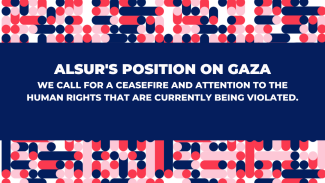Collective position Gaza Strip Situation - AlSur
The human catastrophe that is occurring in the Gaza Strip and that has escalated since October 7, 2023, calls us as organizations of the AlSur consortium to make a collective position calling for a ceasefire and attention to the human rights that are currently being violated.
We condemn the terrorist attacks of the Hamas group and the disproportionate response of the Israel Defense Forces (IDF) that became a collective punishment for the entire Palestinian people. The constant bombing of the Gaza Strip and the ground attacks have resulted in the tragic deaths of around 10,000 people - mostly civilians and more than a third of them children - and multiple violations of human rights and international humanitarian law.
Since the first weeks of the conflict, the ability of the Palestinian people and media to access telecommunications has been limited as a combination of attacks on critical infrastructure, power outages, gasoline and deliberate technical disruptions to the Internet. This situation directly affects the ability to
communicating outside the besieged territory and accessing information that can be life-saving - including the location of shelters and supplies. These actions only worsen the humanitarian crisis, impeding the ability to act and help people who urgently need it, as well as the recording and documentation of possible human rights abuses as reported by multiple international organizations such as WHO, UNICEF, Doctors without Boarders, the United Nations High Commissioner for Human Rights, among others.
In addition to the impact on telecommunications, freedom of expression and information is being violated due to the insecurity of journalists covering the war and the implementation, on the part of technological platforms, of biased content moderation measures.
According to the Committee to Protect Journalists (CPJ) at least 42 journalists have been killed (37 Palestinians, 4 Israelis and 1 Lebanese), 9 injured, 3 have been declared missing and 13 arrested.
On the other hand, the way in which the main internet platforms have managed content moderation makes equitable access to information impossible, strengthening a false dichotomy at the level of discourses and narratives of the situation. The over-moderation of Palestinian content on Meta platforms and the persistent presence of racist discourse and incitement to violence only amplifies a narrative that directly affects the life, integrity and security of the Palestinian civilian population.
There have also been reported cases of inappropriate emoji generation by WhatsApp's artificial intelligence tools and biased translations by Instagram's artificial intelligence model. These incidents reflect a persistent problem of AI-driven dehumanization affecting Palestinians due to biases in training datasets.
Another example along these lines, are AI models and voice assistants such as Amazon's Alexa, which have been shown to have biased criteria when interpreting conflict. This difference in criteria to address the situation, only make the debate more precarious and may even justify disproportionate actions towards the civilian population in Gaza.
In this context, as organizations committed to human rights, we join the international community in denouncing human rights abuses and call for action to restore essential services in the affected areas, as well as guarantees for the integrity of the people who have been affected. We call for the respect and protection of all voices and the right to freedom of expression of the people, allowing for adequate recording, monitoring and sufficient information about what is happening in the territory of the Gaza Strip.
We stand in solidarity with the civilian population that is the most affected in this situation and reiterate our call for a ceasefire.
This is a human catastrophe that requires the responsibility of all actors involved.



